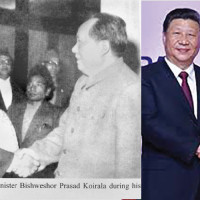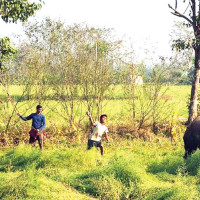- Sunday, 3 August 2025
Compilation Of Culinary Terms
Dictionaries have long been regarded as essential tools for language learning, offering translations and definitions that bridge linguistic gaps. Traditionally, readers have relied on English-to-English or English-to-Nepali dictionaries to expand their vocabularies and enhance comprehension. However, as the world becomes increasingly specialised, the need for subject-specific dictionaries has grown significantly. In this evolving landscape, the Falang Food Dictionary by Shiva Neupane stands out as a groundbreaking contribution, not just to culinary literature but to Nepal’s publishing history. This pioneering work offers an extensive exploration of global cuisines and food terminologies, opening new avenues for culinary education and food journalism.
Shiva Neupane, a Nepali-born, Australian-based food writer and former chef, has carved a niche for himself through his transformative journey in the hospitality industry. Arriving in Melbourne, Australia, in 2007 as a student, Shiva embarked on his culinary career as a kitchen helper. Initially tasked with washing dishes and assisting with ‘mise en place’—a French culinary term meaning “everything in its place” before cooking—he gradually honed his skills and developed a profound interest in food and its cultural significance. Despite coming from a patriarchal society in Nepal, where men rarely engage in cooking, Shiva’s resilience and adaptability turned what began as a means of survival into a passion for culinary arts and food writing.
His early experiences in Australia were fraught with challenges. Navigating the fast-paced restaurant environment was overwhelming, as the pressure of excessive workloads and exposure to hot water in commercial kitchens tested his endurance. Yet, these hardships shaped his character and deepened his resolve to excel in the culinary field. Shiva’s curiosity led him to observe leftover traces of food and sauces on plates, taking notes of unfamiliar ingredients and dishes. Conversations with senior colleagues further expanded his culinary vocabulary. Over time, his meticulous observations and growing knowledge culminated in the creation of the Falang Food Dictionary. The dictionary is named after Shiva’s birthplace, Falang, a small village in the Syangja district of Nepal, reflecting his deep-rooted connection to his heritage.
The Falang Food Dictionary boasts an impressive compilation of over 100,000 words, offering readers an eclectic mix of cuisines from around the world. Its comprehensive coverage demonstrates Shiva’s fascination with the etymology and cultural migration of food terminologies. For instance, the word “samosa,” a popular snack in Nepal and India, has transcended regional boundaries to earn a place in the Oxford English Dictionary. Such examples highlight the dynamic evolution of culinary language and underscore the global relevance of food culture.
Shiva’s journey from dishwasher to accomplished author illustrates his unwavering determination and intellectual growth. His immersion in Melbourne’s multicultural culinary scene provided the ideal environment for expanding his gastronomic knowledge. The city, celebrated as a melting pot of cultures, offered Shiva firsthand exposure to diverse cuisines, enabling him to document and preserve culinary terminologies in an unprecedented manner. His dedication and literary achievement were recognised in 2021 when he received a supportive letter from Scott Morrison, the then Prime Minister of Australia, commending his efforts to promote multicultural understanding through food literature.
Before this milestone, Shiva had already made waves with his Falang English Dictionary, published during his student years in 2015. This earlier work earned him a certificate of appreciation from the Geelong Nepalese community, presented by Richard Marles, who now serves as Australia’s Deputy Prime Minister. His contributions to literature were further honoured with the prestigious Prithivi Excellence Award for his work in lexicography and food writing. Most recently, Shiva received the National Pride Award during the 15th anniversary celebration of Glory Media, broadcasted via NTV, solidifying his status as a trailblazer in Nepalese literature.
The Falang Food Dictionary represents more than just a collection of culinary terms; it serves as an educational tool for promoting food literacy and fostering awareness about healthy eating habits and dietary practices. Shiva’s work sheds light on critical concepts such as food banking systems, food donation acts, and sustainable practices. He emphasises the need for Nepal to establish food banks, ensuring that low-income families can access nutritious meals with dignity, rather than being exploited in online content aimed at showcasing poverty.
Furthermore, the dictionary highlights ethical concerns surrounding food production, including the exploitation of animals for gourmet delicacies like civet coffee, also known as ‘Kopi Luwak.’ It explores terms such as heritage food, halal food, and futuristic culinary trends, while addressing sustainable practices like seed libraries and ethical sourcing. By delving into these topics, Shiva encourages readers to consider the social, cultural, and ethical dimensions of food consumption.
In addition to its academic and cultural significance, the Falang Food Dictionary advocates for the growth of food journalism in Nepal. Shiva envisions a media landscape where food journalism plays a vital role in promoting food safety, dietary awareness, and restaurant inspections for public health benefits. By equipping readers with culinary knowledge, his work has the potential to transform how food is perceived, prepared, and consumed in Nepal and beyond.
While the dictionary is a monumental achievement, some readers have pointed out areas for improvement, such as incorporating visual illustrations of food items and ingredients alongside definitions. This enhancement could make future editions even more accessible and visually appealing. Additionally, as a Nepalese writer, Shiva could further explore and document traditional Nepalese cuisines to enrich the dictionary’s representation of local culinary heritage.
Despite these minor suggestions, the Falang Food Dictionary stands as a pioneering work that deserves recognition for its originality and depth. It offers young writers and aspiring chefs a unique resource to navigate the culinary landscape, blending historical insights with practical applications. Its utility extends beyond kitchens, serving as a reference for scholars, journalists, and policymakers interested in food systems and sustainability.
Shiva Neupane’s contribution to literature and culinary education marks a significant step forward in Nepal’s publishing industry. His book not only elevates food literature but also promotes a culture of learning and curiosity about the origins, preparation, and ethical aspects of food. The Falang Food Dictionary is more than just a reference book—it is a testament to human resilience, cultural exchange, and intellectual curiosity.
In summary, the Falang Food Dictionary is a monumental literary achievement that bridges culinary knowledge with cultural awareness. It sets a new benchmark for food journalism and culinary education in Nepal, making it a must-read for anyone passionate about food and its broader implications. Shiva Neupane’s remarkable journey and literary triumph deserve not just national acclaim but international recognition, inspiring future generations to explore the rich and diverse world of food.
(The author is a poet, journalist and peace advocate.)
















